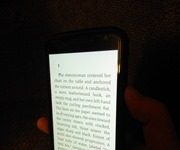 Today’s Morning Links had a post from Book Riot on the ‘benefits’ of reading a book you don’t like. I wasn’t sure what I wanted to do with it at first; I have written on this topic before, and the short version is that for me, life is too short to read bad books, so I don’t. eBooks have made me profoundly less patient—there is plenty more where that came from, whatever the ‘that’ might be, and if a book is not working for me, I make no excuses about giving it the boot.
Today’s Morning Links had a post from Book Riot on the ‘benefits’ of reading a book you don’t like. I wasn’t sure what I wanted to do with it at first; I have written on this topic before, and the short version is that for me, life is too short to read bad books, so I don’t. eBooks have made me profoundly less patient—there is plenty more where that came from, whatever the ‘that’ might be, and if a book is not working for me, I make no excuses about giving it the boot.
But then I looked a little closer at the article, and I found that they were targeting a different sort of reader with it. The author of it is an MFA, and was addressing colleagues in the field. If you are a student of literature, then yes, you do need to know of which you speak. I have had this same debate with the Beloved sometimes—he feels that some of the books he read in high school made him hate reading, and he wishes that English teachers gave as much thought to cultivating a love of books as they give to educating on content for the purposes of standardized testing.
I see his point, but only to a degree. Yes, I do think cultivating a love of reading is important. But I also think that literature as an academic subject should be treated the same as any other academic subject. There is a canon you simply must get through to have a solid grounding in the basics. Can a student of history skip over the US constitution because it has archaic language and is boring? Can a student of science omit biology because their interests are more into other things? Of course not. You cover the canon, right? And after you’ve done that, then you can do what you want to.
The purpose of elementary school reading is to cultivate a love of books. The purpose of high school reading is to cover the basics of the canon so that students who never study it again will know the basics of our cultural history. If they want to read fun books, they can—and should—read those separately. The basics need to be done, fun or not.
With that said, I did pursue the study of literature further, and now that’s done. My English degree covered the major authors of every time period. I did my Chaucer time. I did my Alexander Pope time, and my Romantic Poets time. I know the basics. I don’t need to study them anymore. So I have reached the point in my reading life where I do, once again, read only for fun. I have perhaps a deeper understanding of what I read thanks to the studies I did in university. But I am not in school anymore. So if a book isn’t fun for me, I have no guilt whatsoever about giving it up.

































I loved Graham Greene’s The Comedians, but unlike the author of the blog post, The Hunger Games didn’t work for me on any level. It would be nice to believe there was something to learn under the popular entertainment vainer that I was too dense and obstinate to recognize. After all, it thrilled a bozillian readers and moviegoers. But I still saw nothing of value. Where would be the benefit of reading the sequels? There are other novels by Graham Greene I haven’t read.
@Greg,
If only Greene’s books were available digitally in the US. If they were, I’d give The Comedians a try on your recommendation.